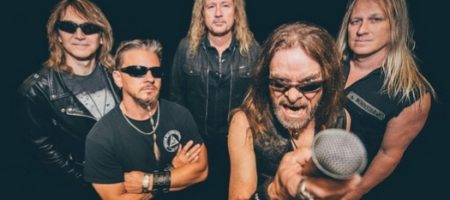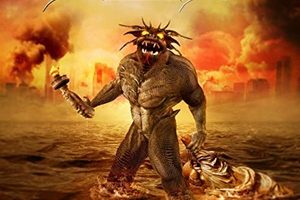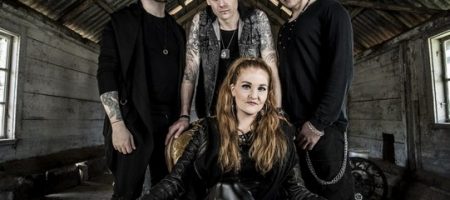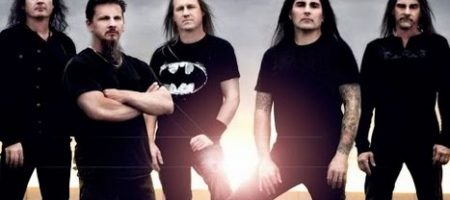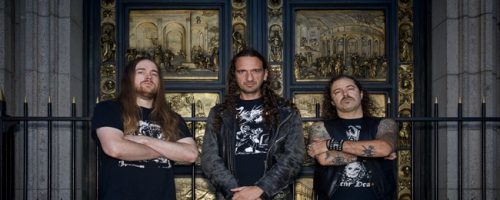Flotsam and Jetsam – Out for Blood
Sunday, 30th May 2021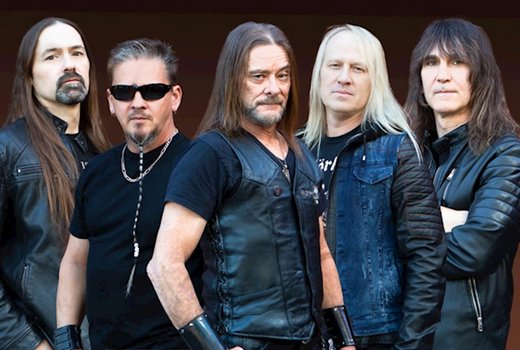
Pioneers during the 1980’s for US thrash, especially developing a semi-progressive meets melodic angle through classic records like Doomsday for the Deceiver and No Place For Disgrace – Flotsam and Jetsam have been climbing back up the ranks through their latest studio offerings. Proving that even with their veteran status, these gentlemen can still create catchy songs with power, aggression, and grace – Blood in the Water being the latest record to hit the streets. We were able to catch up with guitarist Michael Gilbert to bring us up to speed on the new record, the new bassist, thoughts on his guitar work with Steve Conley and Edward Carlson, discussion on the challenges of the 1990’s and being dropped from MCA, plus talk of a future live DVD in the pipeline.
Dead Rhetoric: Blood in the Water is the fourteenth Flotsam and Jetsam studio album. You admit in the background information that considering the energy and input placed into the previous record The End of Chaos, you had concerns about having enough in the tank to develop as strong or even better record. Now completing this, what are your thoughts in reflection on the process front to back from initial ideas to completion – where do you see the differences and how critical were you that these songs met or exceeded expectations?
Michael Gilbert: Oh. This is awesome. We were a little worried after The End of Chaos record because Flotsam has been on an upward trajectory ever since the self-titled record. It’s our understanding that if you make three good records in a row, it’s kind of the magic solution I guess. Not only did we have the pressure of making sure that we would top the Chaos record but making another good record. I’m super proud of the guys in this band and how the record turned out.
We started writing it and we didn’t know what to expect. We were concerned for sure. Once we started getting into it and we heard AK’s first lines and the things he was putting down, our ears perked up and we knew we were on to something here. When we finally got it back from the mix, we at least made something that if it’s not better than Chaos, it’s at least equal to it. It’s a great follow-up to that record.
Dead Rhetoric: Was it easy to decide which singles would come out – because it seems like there are a lot of strong choices this time around?
Gilbert: I hear the guys joking all the time, musicians like to say ‘we just released the record, and it’s all killer, no filler’. You’ve heard that saying before. And this is like… I kind of feel like that. Everything is good on the record, we didn’t have any filler songs. We dumped a lot of other songs too. It was very difficult to decide which ones to keep and which ones to let go. It seemed to work out okay with what we’ve got.
Dead Rhetoric: Do you enjoy writing the shorter, tighter songs more so than some of the epics you’ve done in the past?
Gilbert: I like doing both. I love punk music, so fast and short is kind of the formula for punk. But the long ones are fun, they are trying to play. It’s like a storyline, it starts in one spot and tells a story, it would be like an epic song.
Dead Rhetoric: Where do you believe Eric AK and the band as a whole wanted to come across with the lyrical content this go around? Do you find it’s easier as you get older to channel the social/political climate and challenges into strong topics that your followers can easily relate to and maintain staying power?
Gilbert: I believe that. We try to stay away from any kind of political stuff because it’ll alienate you from your fans. If I was to say I was a Democrat or a Republican, that might even if someone likes the band, with my political stance they might just shut down. In what we do, there shouldn’t be anything like that anyway, it should be people’s escape, to enjoy music and people enjoy it to get away from their day to day stress and lives that they are dealing with. AK has some deep, deep emotional stuff he put on this record. In my opinion he is the best singer in metal, he’s topped himself on this one with his choruses and his lyrical content. He just did a fantastic job, I am so proud of him.
Dead Rhetoric: You have bassist Bill Bodily (who has been on tour with the band a few times in the past few years) now in the fold following the departure of Michael Spencer. Where do you see his skill set and efforts slotting in with the rest of Flotsam and Jetsam?
Gilbert: He’s a total asset to the band. It was a no brainer when we lost (Michael) Spencer, since Bill did a lot of fill in days for Spencer. It made it really easy, but he wasn’t a part of the songwriting process because we didn’t have him in until just before we finished the record. As far as the songwriting skills, I’m anxious to see how he does and I know he’s going to fit right in. He’s got structure with the stuff he’s done in his other bands like Contrarian, and he’s got a great bass tone. I can’t wait for him to actually write with us.
Dead Rhetoric: How would you compare the differences on songwriting and guitar playing with Steve Conley versus your time for decades with Edward Carlson? And do you believe your views on the role you have with your playing and performances in Flotsam and Jetsam have evolved and changed from the start to today?
Gilbert: Totally. Some of the views – way back in the day when we would write a song, and bring it to rehearsal, we would play it super fast and I didn’t want to change anything. If you wanted to change it, I was almost like a baby – wah wah, you want to change my song! (laughs) . And it’s not like that anymore. I’m happy to give my music to these guys and be like, hey man – if you hear something different, by all means let’s chop it up and let’s make it… When you are writing a song you are kind of in a bubble, and you don’t want outside ears to hear it. That part of it is kind of challenging.
About Edward and Steve, they are two totally different styles of playing. Ed was great at what he did, and Steve challenges me every day. It’s a really healthy competition, us trying to top each other’s guitar solos all the time. He’s my beer drinking buddy and my guitar buddy. Ed and I weren’t really like that, we were friends but Steve and I are pretty close.
Dead Rhetoric: You’ve definitely built a stronger profile as a touring act over the last few record cycles where people want to consistently see the band now year in and year out. Do you enjoy the upswing and interest in thrash metal, that now seems to have appeal to a second (and third) generation of followers – not just stateside but internationally?
Gilbert: Oh yes, I am loving it. We go to the shows, we play these shows and we see a younger crowd showing up. We see kids that are fifteen and sixteen years old, up front singing along with AK and that gives me a chill. It’s really cool when something that you did so many years ago, these kids weren’t even born yet and they are singing the “Doomsday” lyrics, well they probably shouldn’t be singing the “Hammerhead” lyrics but (laughs).
Dead Rhetoric: Did it ever wear you down to see the changing tides in the metal scene, especially during the mid-1990’s when you were on tour with Megadeth, Fear Factory, and Korn where the latter seemed to be on a huge upswing due to their fresh style?
Gilbert: Yeah, that was pretty… hard to deal with. We were a part of a movement within the underground, the metal scene got pretty big. It was kind of moving to mainstream, and then it just dropped off, almost not making it cool to be in a metal band. It cycled its way through, getting its feet under it again over the last few years. Now, it’s bigger and more popular than ever. So that brings a big smile to my face. It brings in new fans, it’s really cool.
Dead Rhetoric: How do you think you got through those challenging times? You got dropped by MCA and then went back to Metal Blade for the High record… how did you personally handle those ups and downs?
Gilbert: When you get dropped by a major label, it’s not that big of a deal. It was, but it really wasn’t. We had Michael Alago that was working with us as our A+R rep, and he was a big fan of the band. He was on the frontlines trying to get us all the marketing, the promotions from the bigger labels. They didn’t know how to market our style back then. It’s hard to work with people that are working for you, they don’t understand metal. They are suits, and they couldn’t understand what we were all doing. How are they going to market and sell it? It was better for us to go to a label like Metal Blade, AFM, stuff like that- these are major labels now though in metal, right? You get the love there, you get the people who understand the marketing, they have the thumb on the pulse of the music and the metal industry.
We lost the big money they were giving out then, but of course you had to pay it all back.
Dead Rhetoric: How do you think the band has handled the changing tides of the music business – where internet tools, social media channels/platforms, and consistent fan interaction/promotion seem more important than ever, even with dwindling physical sales and lower studio budgets for records?
Gilbert: Yeah, it’s definitely changed from the times you put your demo tape inside of an envelope and send it out. That was our promotions back in the day. There are so many platforms, it’s confusing for us, and for everybody. Luckily most of our fans have Facebook and Instagram. Keeping up on the posts and updated isn’t really super challenging for us. I’m an IT guy, some other guys in the band do the same stuff, it’s not too difficult.
Dead Rhetoric: With fourteen albums to choose from in a live set list, even in a headlining situation it’s almost impossible to please all followers into Flotsam and Jetsam. Will you be switching things in and out tour to tour – as it’s been quite a while that we’ve heard material from say an album like Cuatro in the set, surprising considering the success of “Wading Through the Darkness”?
Gilbert: Yeah, you know. We do these tours in Europe, and the best way I can explain it is like, they are brutally honest about stuff. For years they only wanted to hear songs off the first two records, and nothing else. Maybe some stuff off The Cold. If you play anything else, they would tell you after the show as we like to hang out with the fans and people afterwards. It was an eye-opener then, but since the self-titled record, The End of Chaos, and Blood in the Water, we have started to see that they want to hear new material. Which I think is pretty cool for a classic metal band such as ourselves to release new material and the fans are starting to like it.
Of course we still have to play our “No Place For Disgrace”, “Hammerhead”, the classics, but I am glad they are locking on to the new stuff too. There is a song on Drift I would love to play “12 Year Old with a Gun”, I think that would really mix well in our set. It’s a driving song. “Wading Through the Darkness”, I would love to play that too – but when you go from “Hammerhead” to that, we want to keep the momentum of the show up.
Dead Rhetoric: Were you surprised to get a lot of MTV video play during the daytime beyond Headbangers Ball for “Wading Through the Darkness”?
Gilbert: Yeah. We were pretty happy with that. The director had this idea, and this was before technology. That you could watch it differently if you turned the tints up on your tv to see different pictures. That was technology for then. It was an experimental thing, messing around with the brightness.
Dead Rhetoric: How does Michael Gilbert like to enjoy his downtime away from music as far as hobbies, interests, and passions when you have the free time and energy to do so? As I remember seeing pictures on your Facebook profile relating to your love of motorcycle riding…
Gilbert: Yes, I just got off a ride up the Pacific Coast Highway and back. That was five days of not worrying about anything, clearing the head. That’s my main hobby. I like snowboarding stuff – and people ask me ‘but you are in Arizona – how can you snowboard?’. It’s an hour and a half away.
Dead Rhetoric: Do people ever seek you out for advice as far as the music business, and if so what do you talk to them about?
Gilbert: Oh, that’s a great question. I do get that from time to time. I’ll say the same thing that Alice Cooper said to me. I met him one time and he was pretty cool. He says, ‘you are one of the Flotsam guys, right?’ I said, yes. He said, ‘don’t break up!’, and he walks away (laughs). I was like man… the gods have spoken. Don’t break up, and also be a little bit with your writing, be flexible. However many people are in your band, all of them combined together is better than just one.
Dead Rhetoric: Do you believe it’s important to have influences beyond thrash to help each act stand out? I think that’s a major difference between the older artists and the newer ones coming up…
Gilbert: Oh yeah. I’m influenced by almost everything I hear. There is some stuff on the new record where I am a big Dave Matthews Band fan. I was listening to it, and for lack of a better word I stole his (stuff)! (laughs). There is a song on the Blood in the Water that has the same feel as “What You Are” by Dave Matthews.
Dead Rhetoric: How do you see the next year or two setting up for Flotsam and Jetsam in terms of promotion for the new record? Could you ever see yourself writing an autobiography on your life in music, or the band possibly doing a long-form documentary on the history of the band?
Gilbert: I would love to do that. There is so much stuff, it would be a thousand pages. We are working on a live DVD now, but a documentary if the right people can present it and do it and interview everyone including the people from back in the day, I think that would be great. We are trying to put something together for a tour, like a Southwest ten-day tour before we do our European tour. Just to get the lead out, we haven’t been playing for so long. We are definitely a live band, and it will put us back into shape for what we do.
Flotsam and Jetsam on Facebook












